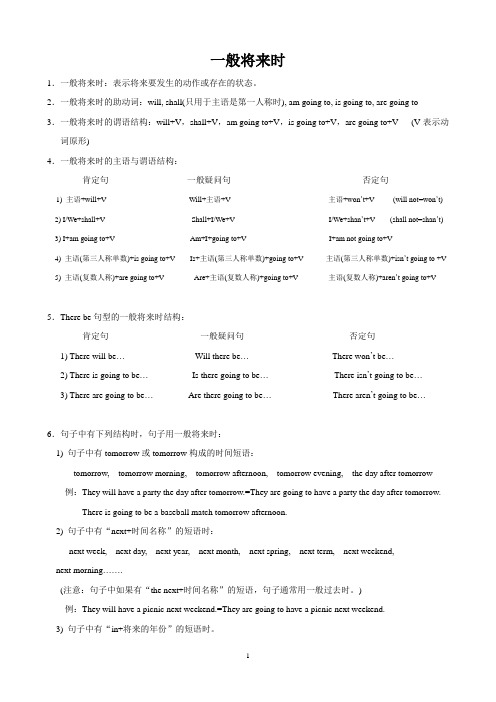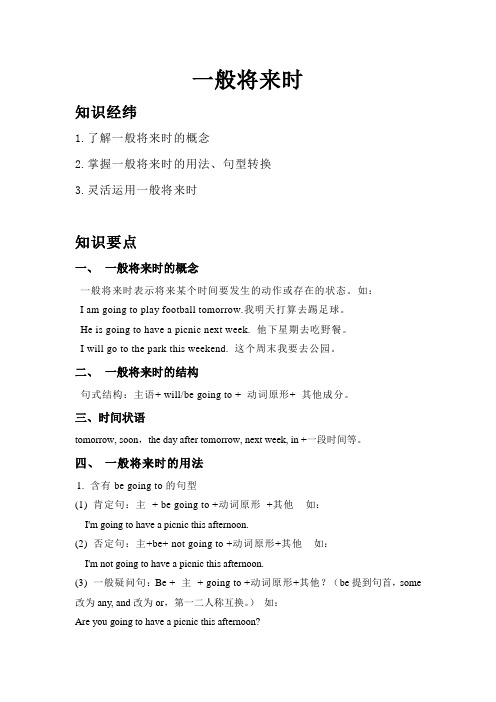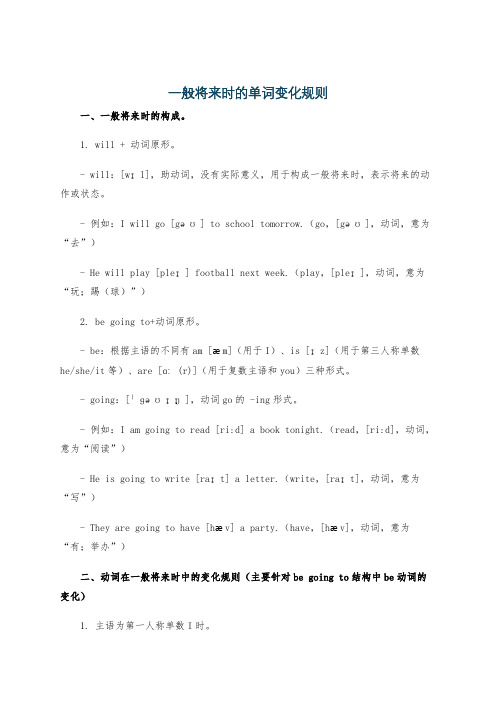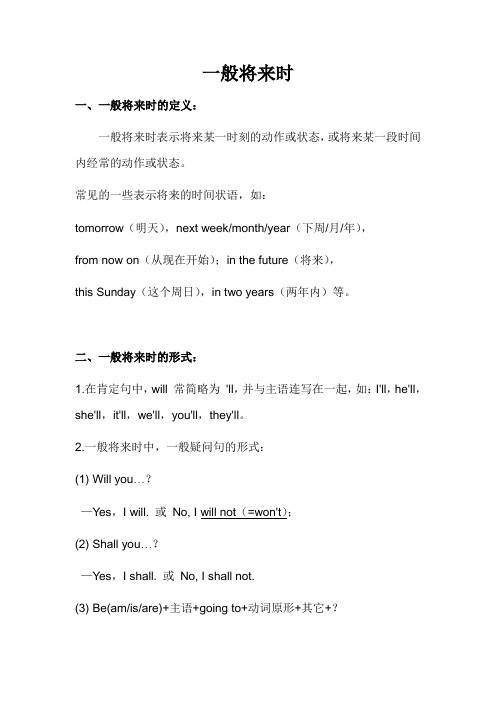一般将来时
一般将来时用法总结

一般将来时1.一般将来时:表示将来要发生的动作或存在的状态。
2.一般将来时的助动词:will, shall(只用于主语是第一人称时), am going to, is going to, are going to3.一般将来时的谓语结构:will+V,shall+V,am going to+V,is going to+V,are going to+V (V表示动词原形)4.一般将来时的主语与谓语结构:肯定句一般疑问句否定句1) 主语+will+V Will+主语+V 主语+won’t+V (will not=won’t)2) I/We+shall+V Shall+I/We+V I/We+shan’t+V (shall not=shan’t)3) I+am going to+V Am+I+going to+V I+am not going to+V4) 主语(第三人称单数)+is going to+V Is+主语(第三人称单数)+going to+V 主语(第三人称单数)+isn’t going to +V5) 主语(复数人称)+are going to+V Are+主语(复数人称)+going to+V 主语(复数人称)+aren’t going to+V5.There be句型的一般将来时结构:肯定句一般疑问句否定句1) There will be…Will there be…There won’t be…2) There is going to be…Is there going to be…There isn’t going to be…3) There are going to be…Are there going to be…There aren’t going to be…6.句子中有下列结构时,句子用一般将来时:1) 句子中有tomorrow或tomorrow构成的时间短语:tomorrow, tomorrow morning, tomorrow afternoon, tomorrow evening, the day after tomorrow 例:They will have a party the day after tomorrow.=They are going to have a party the day after tomorrow.There is going to be a baseball match tomorrow afternoon.2) 句子中有“next+时间名称”的短语时:next week, next day, next year, next month, next spring, next term, next weekend,next morning…….(注意:句子中如果有“the next+时间名称”的短语,句子通常用一般过去时。
一般将来时

一般将来时知识经纬1.了解一般将来时的概念2.掌握一般将来时的用法、句型转换3.灵活运用一般将来时知识要点一、一般将来时的概念一般将来时表示将来某个时间要发生的动作或存在的状态。
如:I am going to play football tomorrow.我明天打算去踢足球。
He is going to have a picnic next week. 他下星期去吃野餐。
I will go to the park this weekend. 这个周末我要去公园。
二、一般将来时的结构句式结构:主语+ will/be going to + 动词原形+ 其他成分。
三、时间状语tomorrow, soon,the day after tomorrow, next week, in +一段时间等。
四、一般将来时的用法1. 含有be going to的句型(1) 肯定句:主+ be going to +动词原形+其他如:I'm going to have a picnic this afternoon.(2) 否定句:主+be+ not going to +动词原形+其他如:I'm not going to have a picnic this afternoon.(3) 一般疑问句:Be + 主+ going to +动词原形+其他?(be提到句首,some 改为any, and改为or,第一二人称互换。
)如:Are you going to have a picnic this afternoon?肯定回答:Yes, I am.否定回答:No, I’m not.2. 含有will的句型(will可用于所有人称,shall只用于第一人称I和we)( 1 ) 肯定句:主+ will +动词原形+其他如:I will play football tomorrow.(2) 否定句:主+ won’t +动词原形+其他(will后加not成won't)如:I won’t play football tomorrow.(3) 一般疑问句:Will + 主+ +动词原形+其他?(will提到句首,some改为any, and改为or,第一二人称互换) 如:Will you play football tomorrow?肯定回答:Yes, I will.否定回答:No, I won’t.五、一般将来时的特殊疑问句一般情况下,一般将来时的对划线部分有三种情况。
一般将来时的单词变化规则

一般将来时的单词变化规则一、一般将来时的构成。
1. will + 动词原形。
- will:[wɪl],助动词,没有实际意义,用于构成一般将来时,表示将来的动作或状态。
- 例如:I will go [gəʊ] to school tomorrow.(go,[gəʊ],动词,意为“去”)- He will play [pleɪ] football next week.(play,[pleɪ],动词,意为“玩;踢(球)”)2. be going to+动词原形。
- be:根据主语的不同有am [æm](用于I)、is [ɪz](用于第三人称单数he/she/it等)、are [ɑː(r)](用于复数主语和you)三种形式。
- going:[ˈɡəʊɪŋ],动词go的 -ing形式。
- 例如:I am going to read [ri:d] a book tonight.(read,[ri:d],动词,意为“阅读”)- He is going to write [raɪt] a letter.(write,[raɪt],动词,意为“写”)- They are going to have [hæv] a party.(have,[hæv],动词,意为“有;举办”)二、动词在一般将来时中的变化规则(主要针对be going to结构中be动词的变化)1. 主语为第一人称单数I时。
- be动词用am。
例如:I am going to visit ['vɪzɪt] my grandparentsthis weekend.(visit,['vɪzɪt],动词,意为“拜访”)2. 主语为第三人称单数(he/she/it等)时。
- be动词用is。
例如:She is going to sing [sɪŋ] a song at the concert.(sing,[sɪŋ],动词,意为“唱歌”)3. 主语为第二人称you或者复数(we/they等)时。
一般将来时知识点

一般将来时知识点一般将来时是英语中用来表达将来时间的一种时态。
在本文中,我们将介绍一般将来时的基本用法和相关的注意事项。
1. 用法一般将来时表示将来某个时间会发生的动作或存在的状态。
通常使用以下方式构成一般将来时:- 使用助动词 "will" + 动词原形,例如:I will go to the cinema tomorrow.- 使用 "be going to" + 动词原形,例如:She is going to take a vacation next month.2. 表示计划和打算一般将来时经常用于表达计划和打算。
当我们准备做一些与未来有关的事情时,可以使用一般将来时来表达我们的意图。
例如:- I will visit my grandparents this weekend.- She is going to study abroad next year.3. 表示预测和预见一般将来时还可以用于表示对未来事件的预测和推测。
我们可以根据目前的情况和证据来作出合理的预测。
例如:- It will rain tomorrow. (天气预报)- I think she will become a successful writer in the future. (个人观点)4. 表示意愿和承诺一般将来时还可以用来表示意愿和承诺。
当我们想要表达我们的意愿或者向别人做出承诺时,可以使用一般将来时来表达。
例如:- I will help you with your homework.- They are going to donate money to charity.5. 注意事项在使用一般将来时时,我们需要注意以下几点:- 在第一人称和第二人称中,"will" 和 "be going to" 是可以互换使用的。
例如:I will / am going to buy a new car.- 在第三人称中,"will" 和 "be going to" 有细微的区别。
一般将来时

一般将来时一、一般将来时的定义:一般将来时表示将来某一时刻的动作或状态,或将来某一段时间内经常的动作或状态。
常见的一些表示将来的时间状语,如:tomorrow(明天),next week/month/year(下周/月/年),from now on(从现在开始);in the future(将来),this Sunday(这个周日),in two years(两年内)等。
二、一般将来时的形式:1.在肯定句中,will 常简略为'll,并与主语连写在一起,如:I'll,he'll,she'll,it'll,we'll,you'll,they'll。
2.一般将来时中,一般疑问句的形式:(1) Will you…?—Yes,I will. 或No, I will not(=won't);(2) Shall you…?—Yes,I shall. 或No, I shall not.(3) Be(am/is/are)+主语+going to+动词原形+其它+?如:Are you going to swim tomorrow?—Yes, I am./ No, I'm not.Is he/she going to play football next weekend?—Yes, he/she is./ No, he/she isn't.Are they going to go shopping this Sunday?—yes, they are./ No, they aren't.三、一般将来时的用法:1.一般将来时由“助动词shall(用于第一人称),或者will(用于第一、二、三人称)+动词原形”构成。
这种将来意义常常夹杂着情态意义即带有说话人的主观态度和看法,比如表示“预见”。
有时也含有“意愿”或“意图”的意思。
英语时态:一般将来时

英语时态:一般将来时一般将来时(simple future tense)表示将来某一时段的动作或状态,或将来某一段时间内经常的动作或状态。
一般将来时常常和表示将来的时间状语连用。
如:tomorrow, next week, in the future, in a year等。
Ⅰ. 句法结构【仅讨论陈述句和疑问句两种语式】:1.陈述句:A. 肯定形式:主语+be going to /will/shall +动词原形+其他B. 否定形式:主语+be not going to /will not/shall not+动词原形+其他注:a. 在直接在助动词后加not。
b. be going to结构中的be仅指am, is, are三个be动词。
c. will/shall+动原结构在谓语两态变化中无人称和数的变化。
d. 一般情况下,仅表示时态时,shall用于第一人称,will用于第二、三人称;表示说话人强烈意愿和语气时则用法相反。
2.疑问句:A. 一般疑问句:助动词提前即可①Be动词+主语+ going to +动词原形+其他②Will/Shall+主语+动词原形+其他B.特殊疑问句:特殊疑问词+一般疑问句(同上)3.被动语态:主语+ 助动词(结构) + be +动词过去分词【被动结构be done,时体现在助动词】➢两态变化例句参考下表(以will为例):Ⅰ. 主要用法及结构:1.【一般将来时表将来】一般将来时表示将要发生的动作或情况。
A.will/shall +动原I will(shall) arrive tomorrow.Will you be free tonight?B.be going to+动原a.表示计划、打算、准备做的事。
We are going to put up a building here.b.表示即将发生或肯定要发生的事。
I think it is going to snow.注:在一般将来时的句子中,有时有表示将来时间的状语,有时没有时间状语,这时要从意思上判断是否指未来的动作或情况。
一般将来时态
7.明天的天气会是怎样? What _w_i_ll_t_h_e_w__ea_t_h_e_r _b_e_ l_ik_e__ tomorrow?
4. be about to + 动词原形。 表示 (1)“即将做”或“马上做”
(2)因此,句子不能再用时间状语。
Don’t leave. Li Lei is about to come. 不要走了,李蕾就要来了。 Be quiet. The concert is about to start. 安静下来,音乐演唱会就要开始了。
4:00.
I won’t call Mr. Gao today. I’ll call him tomorrow.
back
“There be”句型的一般将来时 肯定句: There will be +名词+其他成份 [注意]:无论后面加单数名词或复数形式,be都必须用原形。
There will be only one country. 否定句:在will后面加not.
_M_a_y_b_epeople __w_i_ll __l_iv_e __t_o_ _b_e_ 200 years old __in__ 100 years. 3. 许多女孩子喜欢养宠物。
Many girls like _k_e_e_p_i_nga pet. 4. There will be a sports meeting tomorrow.(一般疑问句)
2.They will finish (finish) the work this afternoon.
3.Tom will play (play) football with us tomorrow.
一般将来时总结
一般将来时总结一般将来时(Simple Future Tense)是英语中表示将来发生的动作或状态的一种时态。
本文将对一般将来时进行详细总结,包括形式、用法以及相关的时间状语等内容。
一、一般将来时的形式:一般将来时的基本形式由助动词“will”或“shall”加上动词原形构成。
例如:- I will go to the park tomorrow.(我明天会去公园)- They shall arrive at the airport at 10 o'clock.(他们将在10点到达机场)当主语为第三人称单数(he/she/it)时,“will”后的动词原形需要加上“s”或“es”。
例如:- She will study for the exam next week.(她下周会复习考试)- It will rain tomorrow.(明天会下雨)二、一般将来时的用法:1. 表示计划或意图:用一般将来时可以表达主语打算或计划要做的事情。
例如:- I will visit my grandparents this weekend.(我这个周末会去看望我的祖父母)- He will study abroad next year.(他明年将会去留学)2. 表示预测或推测:一般将来时可以用于表示根据当前的情况或证据所做出的预测或推测。
例如:- I think it will snow tomorrow.(我认为明天会下雪)- They believe she will win the competition.(他们相信她会赢得比赛)3. 表示意愿或允诺:一般将来时可以表达主语的意愿或承诺要做某事。
例如:- I will help you with your homework.(我会帮你做作业)- He will stop smoking.(他将戒烟)4. 表示预定的事件或安排的计划:一般将来时可以用于表示已经安排好的事件或计划。
一般将来时的定义、结构、例句、用法
一般将来时的定义、结构、例句、用法一般将来时一、定义: 一般将来时表示将来某一时刻的动作或状态,或将来某一段时间内经常的动作或状态。
常常和表示将来的时间状语连用。
如: (明天) next week tomorrow , ; (下周 ) in the future(将来)等。
一般将来时由助动词 shall(第一人称),will(第二、三人称) 动词原形构成。
美国英语则不管什么人称,一律用 will。
二、结构(一)常见结构1、will / shall 动词原形(否定句在 will/shall 后加 not)这种方法一般单纯地表示将来某个时间将要发生的动作或存在的状态。
will 用于各种人称shall 只用于第一人称。
例例如 :I will / shall go to visit him nextweek. 下周我将去拜访他。
What time shall we go there tomorrow 明天我们几点去那儿2、be going to动词原形be going to 相当于一个助动词其中 be 有人称和数的变化与它后面的动词原形一起构成谓语。
用来表示将要发生的动作以及计划、安排和打算要做的事。
例如:There is going to be a football match this afternoon.今天下午将有一场足球赛。
I…m going to go to the park. 我将要去公园。
(二)常用结构1、用于I expect Im sure I think I wonder 等的宾语从句中。
Dont worry about the exam. Im sure youllpass.不要担心这次考试,我确信你会通过的。
2、用于祈使句和陈述句中。
Work hard and you will succeed.如果你努力,就会成功的。
3、与表示时间或条件的状语从句连用。
Ill let you know as soon as he arrives.他一到我就通知你。
一般将来时的四种句型结构
一般将来时的四种句型结构一般将来时句型结构一般将来时用于表达未来将要发生或可能发生的动作或状态,其主要句型结构有四种:1. will + 原形动词- 主语 + will + 原形动词 + 其他成分- 例如:- I will go to the store later.(我稍后会去商店。
)- We will have a meeting tomorrow.(我们明天将开会。
)2. shall + 原形动词(疑问句或肯定句中主语为 I/we)- 主语(I/we)+ shall + 原形动词 + 其他成分- 例如:- Shall I open the window?(我打开窗户好吗?)- We shall arrive at 10:00 AM.(我们将在上午 10:00 到达。
)3. be going to + 原形动词- 主语 + be going to + 原形动词 + 其他成分- 例如:- I am going to watch a movie tonight.(我今晚要去看电影。
)- They are going to build a new house.(他们打算建造一所新房子。
)4. be + about to + 原形动词- 主语 + be about to + 原形动词 + 其他成分- 例如:- I am about to leave.(我就要走了。
)- The train is about to depart.(火车就要出发了。
)一般将来时的用途一般将来时主要用于以下几种情况:- 表达未来将要发生的肯定动作或事件- 表达未来可能发生的动作或事件- 表示计划或打算- 表达预测或推测- 表示请求或建议(使用 shall 时)- 表示承诺或保证(使用 will 时)。
- 1、下载文档前请自行甄别文档内容的完整性,平台不提供额外的编辑、内容补充、找答案等附加服务。
- 2、"仅部分预览"的文档,不可在线预览部分如存在完整性等问题,可反馈申请退款(可完整预览的文档不适用该条件!)。
- 3、如文档侵犯您的权益,请联系客服反馈,我们会尽快为您处理(人工客服工作时间:9:00-18:30)。
用来描述一个即将要发生的动作;谈 论未来的计划和打算。
• 二、一般将来时的基本结构:
will/shall+动词原形 be going to+动词原形
三、常见时间状语: • next Tuesday • tomorrow • next week • tonight • the coming Sunday • in a few minutes • next year • in the future • this afternoon • five years later
3. be going to do 的含义
用于表示计划、打算去做某事(强调主观意 愿);还可以表示根据事实情况,有迹象极有 可能发生的事。如: • I’m going to take another route.(计划) • It’s cloudy. I think it’s going to rain. (根据事实极有可能发生)
She will meet her mother in June. I am going to you are going to she is going to
•I will say… •You will see… •He will think… •She will talk…
否定句
• 主语+will not(be not going to)+动词原 型+其它 • She will not meet her mother in June • I will say----I will not say • You will see---- You won’t see • He will think---- He won’t think • She is going to see----She is not going to see • I am going to do----I am not going to do • You are going to do--- You are not going to do
(1)主语的意图,即将做某事。例如:What are you going to do tomorrow? 明天打算作什么呢? (2)计划,安排要发生的事。例如:The play is going to be on next month。这出戏下月上演。 (3)有迹象要发生的事。例如:Look at the dark clouds, it is going to rain. 看那乌云,快要下雨了。
2. Will do和be going to do的区别
will /shall do相对较为正式,常用于书面语, 表示一个相对较远的未来; be going to do常用于口语中,表示一个相对较 近的未来。 e.g. • I’m going to Beijing tomorrow.(较近未来) • There’ll be no living(活着的) things on the earth(地球) if people don’t protect(保护) the environment(环境). (较远未来)
一般疑问句及回答
• Will + 主语+动词原型+其它 • Will she meet her mother in June? • • • • I will say… → Will you say …? Yes, I will. You will see… → Will I see …? No, you won’t. He will think… → Will he think…? Yes, he will. She will talk → Will she talk…? No, she won’t.
时间段+ago:a moment ago / two days ago
介词 + 时间名词: on last Friday, on April 15th,
2010
其它:just now, once
时间状语总结
一般将来时 •next Tuesday •next week •the coming Sunday •next year •this afternoon • • • • • tomorrow tonight in a few minutes in the future five yea. 银行 4. 熊 5.相信 6.自行车 7. 鸟 8.生日 9.黑色的 10. 蓝色的 11.书店 12.盒子 13.早餐 14.老板 15.面包
英译中
1.banana 2. beautifual 3. because 4.bedroom 5.begin 6.body 7.bookshelf 8.boring 9.bowl 10.brain 11.below 12.behind 13.beside 14.between 15.baseball
4. 现在表将来
在英语中,有些动词如go, come, leave, arrive等位置移动词可用现在进行时表示将要 发生的动作。 e.g. • I’m coming. (我就来了。) • Are we all going ? (我们都将去吗?)
Practice
试翻译以下句子: 1、明天他将教我英语。 He will teach me English tomorrow. 2、他们下个星期带我们去他的花园。 They will take us to his garden next week. 3、将来,我要成为一个司机。 I will be a driver in the future.
注意事项
考点
1. Will 和Shall的区别
will用于一切人称,shall只用于第一人称 (I/we)。但现代英语倾向于所有人称都使 用will而不用shall,shall主要出现在非常 正式的英语场合中,或用于口语提出建 议或请求。如: • Shall I go home now? (请求) • Shall we take different routes? (建议)
不规则过去式记忆
• • • • • • • • Keep feel sleep Build lend send Ring sit swim Drive write Think buy Teach Know grow Put let read
begin
Lesson 3
一般将来时
一、一般将来时的意义:
一般现在时
• 肯定句 • 主语 + be (am/is/are)+ 其它 • 主语 + 行为动词 + 其它
• 否定句 • 主语 + be not + 其它 • 主语 + do/does not +行为动词原形+其它
• 一般疑问句 • Be + 主语 + 其它 • Do/does + 主语 + 行为动词原形+其它
试翻译以下句子: 4、下周,我们要去苏州。 We will go to Suzhou next week. 5、她和她的母亲将在六月见面。 She will meet her mother in June.
一般将来时的否定、 疑问及回答
一般将来时的肯定句
主语+will(be going to)+动词原型+其它
一般将来时
• 肯定句 • 主语+will(be going to)+动词原型+其它? • 否定句 • 主语+will not(be not going to)+动词原型 +其它? • • • • 一般疑问句 Will + 主语+动词原型+其它? Yes, 主语+will; Yes, 主语 +be. No, 主语 + will not;No, 主语+be not.
时态总结
时间状语总结
• 一般现在时:
Always/ usually/ often/ every year/ every day
Once a month/ twice a week/ three times a year
On Sundays/ On weekends
时间状语总结
一般过去时: Yesterday/ yesterday morning/ last night, week
• 肯定句 • 主语 + be过去式(was/were) + 其它 • 主语 + 行为动词过去式 + 其它
一般过去时
• 否定句 • 主语 + be过去式 not + 其它 • 主语 + did not +行为动词原形+其它
• 一般疑问句 • Be过去式+ 主语 + 其它 • Did + 主语 + 行为动词原形+其它
一般疑问句及回答
• Be going to + 主语+动词原型+其它 • Is she going to meet her mother this afternoon? • You are going to.. → Are you going to…→Yes, I am. • He is going to.. →Is he going to…→ No, he isn’t.
